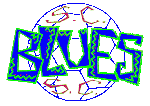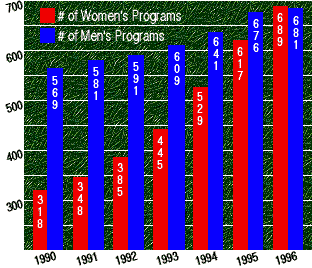Southern California Blues Soccer Club

1997-98 NCAA Guide for College Bound Players



| CORE GPA | SAT | ACT |
|---|---|---|
| 2.5 & Above | 820 | 68 |
| 2.475 | 830 | 69 |
| 2.450 | 840-850 | 70 |
| 2.425 | 860 | 70 |
| 2.400 | 860 | 71 |
| 2.375 | 870 | 72 |
| 2.350 | 880 | 73 |
| 2.325 | 890 | 74 |
| 2.300 | 900 | 75 |
| 2.275 | 910 | 76 |
| 2.250 | 920 | 77 |
| 2.225 | 930 | 78 |
| 2.200 | 940 | 79 |
| 2.175 | 950 | 80 |
| 2.150 | 960 | 80 |
| 2.125 | 960 | 81 |
| 2.100 | 970 | 82 |
| 2.075 | 980 | 83 |
| 2.050 | 990 | 84 |
| 2.025 | 1000 | 85 |
| 2.000 | 1010 | 86 |

Players become ôprospective student athletesö when they begin ninth-grade classes. Players become ôrecruited prospective student athletesö at a particular college if any representative of the collegeÆs athletic interests approaches them about enrolling and participating in athletics at that college.
Activities that cause a student athlete to consider themselves recruited: (1) Official visits to that college (2) Getting phone calls from a representative of that college (3) An off campus visit by a representative of that college.
A student-athlete is eligible to receive ôgeneralö university information through the mail at any time. Phone calls from faculty or coaches (not boosters) are not permitted until July 1 after completion of the junior year of high school and are limited to one per week with the following exceptions where calls may be unlimited:
Letters from coaches, faculty members and students are not permitted until September 1 at the beginning of the junior year of high school.
A college coach may ôcontactö a student athlete in person off campus only after July 1 after completion of the junior year in high school. Any face to face meeting between a college coach and the player or parents of a player, during which any of you say more than ôhelloö is considered a ôcontactö. Coaches are permitted no more than three off campus contacts.
An evaluation is any off campus activity used to assess a student athleteÆs academic and or athletic qualifications. A college coach may not make more than four evaluations during each academic year.
During a student athleteÆs senior year they are eligible to go on "official" visits to a campus if they are invited and notified by mail. Players should make it clear to the coach in question if they want to accept the invitation as a student-athlete is limited to a total of five "official" visits. It would be my personal suggestion that players save those "official" visits for universities where extended travel is necessary. An "official" visit (no more than 48 hours) simply means that the costs are covered by the university. During any time, student athletes may go on "unofficial" campus visits as often as they like. During these "unofficial" visits players may contact the coach and receive any information requested including a campus tour. Nothing may be paid for by the coach or program in question or the visit becomes "official". Players can not go on an "official" visit until they give the college their academic transcripts and a score from the SAT taken on a national test date. The transcript may be a photocopy of official high school transcripts and in most cases the college will use the services of the Initial Eligibility Clearinghouse to validate credentials.

A central clearinghouse will certify athletic eligibility. If freshman intend to participate in college athletics, they must register and be certified by the NCAA Initial-Eligibility Clearinghouse. High School counselors can obtain registration materials at no cost by calling the clearinghouse at (319) 337-1492. In order to be registered, student athletes must complete the student release form and mail the top (white) copy of the form to the clearinghouse along with the $18 registration fee. Give the yellow and pink copies to a high school official who then sends the yellow copy, along with an official copy of transcripts to the clearinghouse. After graduation the school must send in the copy of final transcripts that confirms graduation.

If players are offered an athletic scholarship they may be asked to sign a "Letter of Intent". This is a binding agreement between an institution and the player stating they will accept the scholarship offer and are committing to the college. Once a player signs the agreement, it becomes the playerÆs responsibility to notify all coaches who continue to recruit them, that they are bound to the college in question. If players graduate in 1998 there are certain dates (?/98 and ?/98) between which they are able to sign these agreements. This agreement protects the coach and his/her scholarship investment, it also protects the player so that the scholarship cannot be withdrawn and offered to another player.

1. Carefully examine the 1997-98 College Choice material provided by "Soccer America" magazine.
2. Go through the listings and put together a list of options which sound attractive. I am always available to provide you with further insight about these options if you request it and if I have any information.
3. Gather information from the universities you are interested in either by phone or by mail concerning their academic programs and entrance requirements. If you know what your future course of study will be then you may want to find out if they offer a program in that area and if it is a strong one. While academic standards should be your primary consideration in choosing a college, you will also need information about financial obligations, housing arrangements, the social environment, and the general atmosphere of the university. Ask yourself if you will be happy at the university if you never get to play soccer there.
4. After gathering all of the information from these schools, you will want information about the athletic and in particular, the women's soccer program. Evaluate your ability to make the team and eventually play. You want to be in a position to contribute to your team whatever level they compete at. Most of the programs are new and are starving for competent players. Others are well established and are only looking for players who will have immediate impact as freshman. Consider the financial support the program receives, the coach and his or her philosophy in regards to soccer and team conduct. If you are serious about your soccer and plan to keep improving yourself as a player and person, look at the level of seriousness among the people you will be playing with. Are you committed enough to want to play on a team that will be competing on a regular basis for the national championship? If soccer is important to you, this is where I would want to be; it is a matter of personal choice.
5. Narrow down your list to anywhere from 5-10 schools that best meet your needs. Your education should be your first priority!
6. Prepare a short and informative letter of introduction expressing your interest in possibly attending that particular university and your desire to perhaps play soccer there. Ask for information about application procedures, financial aid, and your desire to have the coach in question evaluate your ability. Include personal information, your ODP, Club, High School, and list your coaches names and phone numbers. Let them know when you will be graduating, if you have information about your cumulative GPA and or SAT scores I would include that as well. Gather information for the coach about where you will be performing throughout the season, tournaments, times and dates. Mail this information to your choices and await any responses. Please be considerate about the time and effort these coaches put in and follow up the response they send you. Feel free to call them by phone once you have established contact.
7. Sort out the universities which most interest you and go on your campus visits. I will be available with advice about your choices only if you request it. The rest will be up to you and your parents to communicate with the coach and school of your choice. Please be professional and responsible in your correspondence with these programs, you may open the door for other players from our club in future years. Be proud of your affiliation with the Blues and be an example for others. Remember we want to take pride in you; communicate and conduct yourself in an honest way.
 THE GROWTH OF NCAA WOMEN'S & MEN'S SOCCER PROGRAMS
THE GROWTH OF NCAA WOMEN'S & MEN'S SOCCER PROGRAMS



 Home Page
Home Page
 BACK TO HOME PAGE
BACK TO HOME PAGE